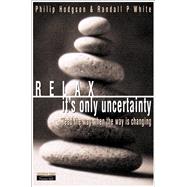In times of uncertainty, the ability to act without fear of failure can be a huge asset. In a world where the only thing you can be certain of is uncertainty, business leaders need to stop trying to control the uncontrollable, and start embracing the unknown. This book will show you how to be comfortable with ambiguity, confident with change, open to discovery and at ease with the new world of business. Then you can lead with confidence and flexibility, whatever the situation.
Want to be more confident about the ambiguities that you and your business face? Ask yourself these questions:
Am I drawn instinctively to the edge of my knowledge rather than the centre of it?
Am I attracted to projects and problems with an element of the unknown in them?
Do I have trouble with heated situations?
Will I generally take a chance and make a decision?
Do I prefer to have a full set of information before deciding?
Do I ask penetrating questions about what's going on?
Can I decide what are the most important things to do?
Can I capture a business strategy in a single sentence?
Your answers will reveal some of the essential elements of personal and corporate success in the new economy. Curiosity, risk taking, focus, persuasion and energy are personal skills that you can bring to bear to tackle tough issues, simplify complex topics, gather energy from complex challenges and carry people with you.
Relax... will help you decide intuitively, act decisively and lead through ambiguity and change. This inventive and interactive book will help you develop the behaviours lead the way when the way is changing.









